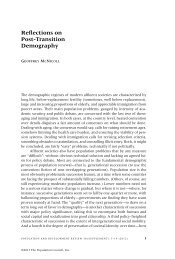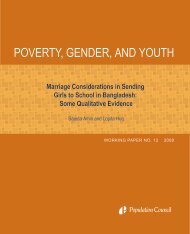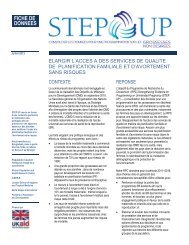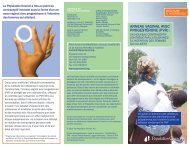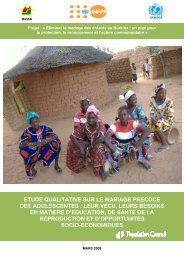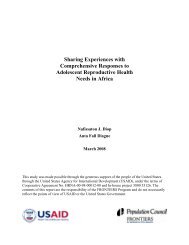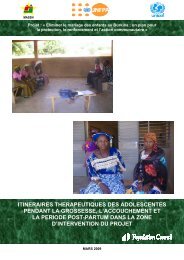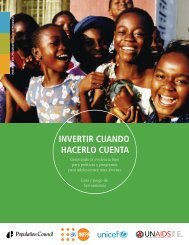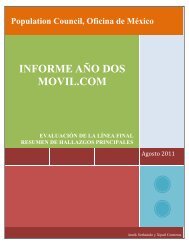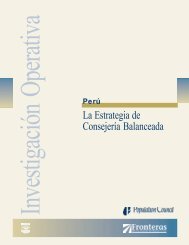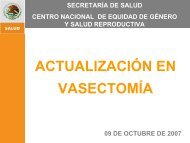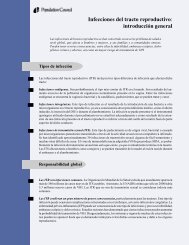Community Health Volunteer's Training Manual - Population Council
Community Health Volunteer's Training Manual - Population Council
Community Health Volunteer's Training Manual - Population Council
Create successful ePaper yourself
Turn your PDF publications into a flip-book with our unique Google optimized e-Paper software.
Reproductive and Child <strong>Health</strong><br />
family planning, family planning benefits the health and well-being of women and families<br />
throughout the world. Using contraception can help to avoid unwanted pregnancies and<br />
space births; protect against STDs, including HIV & AIDS; and provide other health<br />
benefits. Box 4.4.1 lists the benefits of family planing.<br />
Exercise 4.4.1<br />
Objective<br />
1. To discuss the benefits of family planning<br />
Time: 20 minutes<br />
Questions<br />
1. What is the meaning of family planning?<br />
2. What are the benefits of family planning?<br />
Box 4.4.1: Benefits of Family planning<br />
1. Enables mother to remain healthy and strong<br />
2. Helps children grow healthy and strong<br />
3. Enables parents to feed their children well<br />
4. Enables parents to educate their children very well<br />
5. Helps prevent STIs (condoms)<br />
6. Helps avoid unwanted pregnancies.<br />
Instructions to the Facilitator<br />
1. Lead participants to brainstorm<br />
on the topic “Benefits of Family<br />
Planning”.<br />
2. List the responses on a flip chart.<br />
3. Discuss and compare the<br />
responses with those in Box<br />
4.4.1and fill in the gaps.<br />
When a man and a woman decide when they want to have children, and when they do not,<br />
they can choose one of several methods to prevent the woman from becoming pregnant, for<br />
as long as she wishes.<br />
The methods of birth control or contraception available for use in Ghana presently for family<br />
planning are shown in Box 4.4.2. Methods that prevent sexually transmitted diseases as well<br />
prevent pregnancy are called ‘dual methods’.<br />
Exercise 4.4.2<br />
Objective<br />
1. To discuss the various methods of<br />
family planning<br />
Time: 15 Minutes<br />
Questions<br />
1. What methods of family planning do<br />
you know?<br />
2. Which of them have you used before?<br />
3. Which methods serve a dual purpose?<br />
4. Which ones can be used together?<br />
5. Which ones cannot be used together<br />
and why?<br />
Instructions to the Facilitator<br />
1. Let participants mention any<br />
method of family planning at<br />
random.<br />
2. List them on a flip chart<br />
3. Categorise them into short, longterm<br />
and permanent methods;<br />
male and female methods.<br />
4. Find out which methods<br />
can serve as dual protection<br />
methods.<br />
5. Discuss and compare the<br />
responses with those in Box<br />
4.4.2 and fill in the gaps.<br />
205



